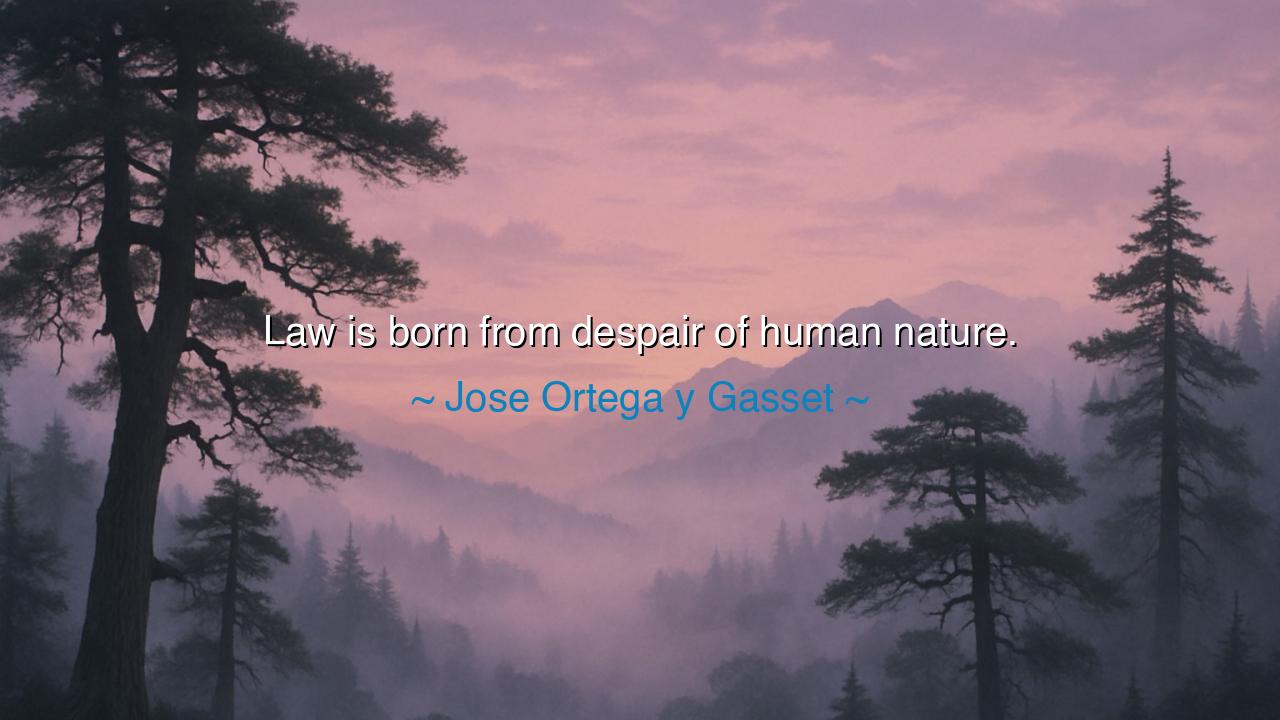
Law is born from despair of human nature.






José Ortega y Gasset, the Spanish philosopher, once declared with piercing clarity: “Law is born from despair of human nature.” These words strike like the tolling of a bell in a quiet valley, echoing through the ages with both sorrow and wisdom. He reminds us that the creation of law is not the fruit of trust, nor of an idealized humanity, but of necessity. It springs from the recognition that men, left to themselves, often betray virtue. Thus, law rises as a guardian, a fence against the storms of selfishness and cruelty.
The meaning of this declaration is profound: Ortega y Gasset saw that humanity does not, by nature, incline toward justice. Instead, it is prone to conflict, greed, and violence. From this despair—the knowledge that human beings cannot be left to their own unchecked impulses—arises the need for rules, for codes, for a binding framework. Law is not written because men are noble, but because men fall short. It is a bittersweet truth: the very existence of courts and statutes is evidence of our imperfection, and yet, without them, society would dissolve into chaos.
The origin of this thought lies in Ortega y Gasset’s broader reflections on civilization. Living through the turmoil of early twentieth-century Europe—wars, revolutions, and the collapse of old orders—he understood deeply how fragile human cooperation can be. He saw how, when passions are unleashed and restraints are broken, men devour one another. Out of such despair, law is born, not as an ornament but as a survival mechanism, a scaffolding to prevent the fall of nations into the abyss.
History offers us countless illustrations of his wisdom. Consider the bloody years of the French Revolution, when the cry for liberty descended into the Reign of Terror. Without stable laws, mobs ruled, suspicion reigned, and the guillotine silenced thousands. Out of that chaos, France learned that unrestrained fervor could not sustain a people—that rules, systems, and codes were needed to bind society together once more. The despair at human cruelty gave birth to new constitutions, for without the anchor of law, the ship of state was dashed upon the rocks of violence.
There is also a deeply emotional current in Ortega’s words. To admit that law is born of despair is to admit sorrow about the human condition: that we are not what we ought to be. And yet, within this sadness lies also a form of hope. For if law is born of our weakness, it can also guide us toward strength. It is a recognition of our fallibility, and in that recognition lies the possibility of growth. To deny the darkness of human nature would be folly; to legislate against it is wisdom.
To future generations, this saying is both a warning and a lesson. The warning is this: never grow naive about human impulses. Pride, envy, and cruelty sleep lightly within the heart, ready to awaken. The lesson is this: build strong laws, not to destroy freedom, but to protect it. Understand that the fences of law exist not because we are saints, but because we are human. The wise do not despise the law, but honor it as the vessel that keeps civilization afloat upon turbulent seas.
The lesson for each individual is clear: do not rail against every law as a chain upon your freedom, but ask instead whether it shields against injustice. Live with awareness of your own flaws, and see law as a teacher that restrains the worst within us while preserving harmony among us. Practically, this means respecting just laws, working to reform unjust ones, and never imagining that civilization can endure without them. The vigilance of citizens is the true safeguard against both lawlessness and tyranny.
Thus Ortega y Gasset leaves us this inheritance: “Law is born from despair of human nature.” Let us not despair in vain, but let us craft laws that rise from wisdom, that protect the weak, that restrain the powerful, and that remind us always of our shared frailty. For though despair gives birth to law, it is through law that hope may yet endure.






AAdministratorAdministrator
Welcome, honored guests. Please leave a comment, we will respond soon